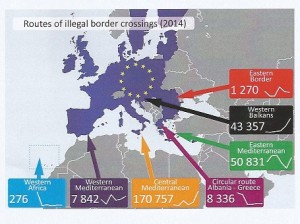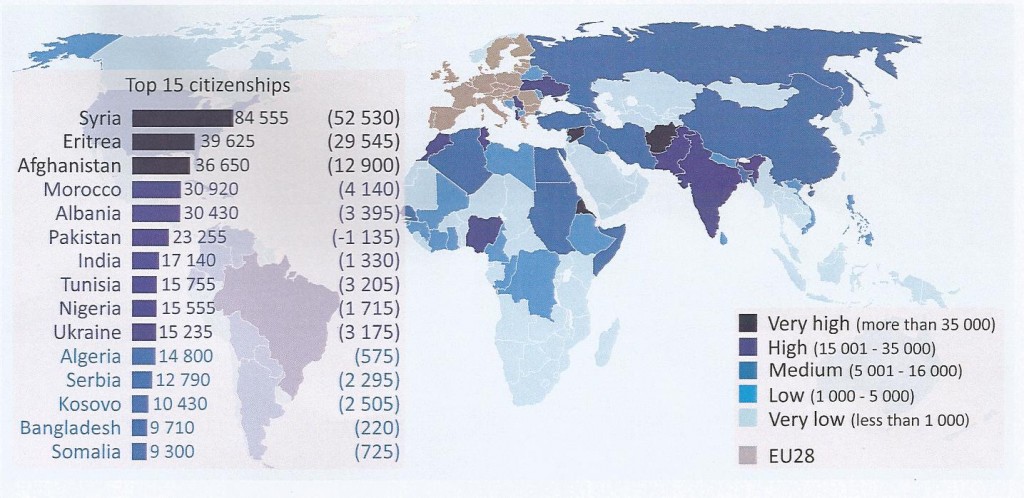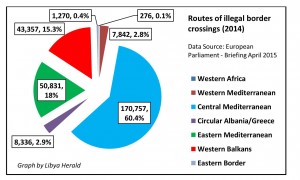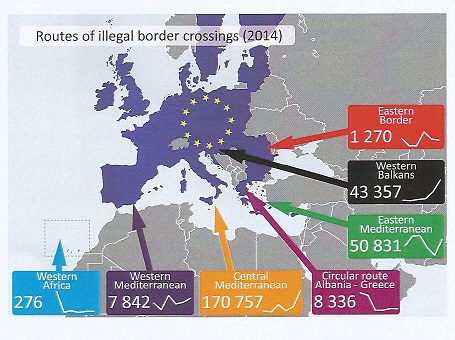By Sami Zaptia.

Malta, 28 June 2014:
European Parliament figures show that over 170,000 (60.4%) illegal migrants crossed over into Europe through the . . .[restrict]Libyan route in 2014. Of all the main seven routes used by illegal migrants into Europe highlighted by this briefing, the Libyan route was over three times higher than the second most popular route. Over 282,000 illegal migrants entered Europe in 2014, the report says.
The report and illegal migration figures were debated during a conference organized by the European Parliament held in Malta on Friday: ‘‘Euro-Med: Evolving realities, shared challenges’’ which was attended by Libya Herald.
However, it is estimated that already over 100,000 illegal migrants have crossed the Mediterranean Sea in the first 6 months of 2015.
At the conference it was revealed that the issue of illegal migration is not high on the political agenda within Libya. Libyans are not hotly discussing the topic around their Ramadan iftar tables as they break-fast at sunset every day.
It was also proposed that there is no incentive for both the internationally recognized Libyan government, based in the eastern city of Al-Beida, nor the unrecognized pseudo government based in Tripoli, to fight the flow of illegal migration to Europe. They both have more pressing fundamental and everyday issues on their political plates.

The two contending political factions in Libya are too busy fighting for their own survival as political entities, fighting each other to hold on to territorial and political gains and fighting to keep the nation of Libya intact as a unitary state.
At the conference speakers representing the Maltese state as well as the organiser of the conference, MEP Roberta Metsola, stressed the need for the EU collectively as well individual Mediterranean rim European states to work more closely with Libyan interlocutors.
However, it was pointed out that both Libyan de facto controllers of territory were very weak. The EU was faced with dealing with two state interlocutors not the usual one state partner. The two Libyan ‘’governments’’ were in reality quite weak and their monopoly on power was questionable.
The EU collectively and EU Mediterranean states were used to acting with one strong unitary nation state that enjoyed a total monopoly on the use of force and the fact this is not the case in Libya at present makes an EU anti-illegal migration policy based on acting with such a strong interlocutor a questionable policy.
This point underscores the need for the EU to urgently help solve the whole ‘’Libyan problem’’. Only a strong and unified Libyan state that enjoys a monopoly on the use of force in the country could act as an effective interlocutor with the EU states.
A point of caution was also raised at the conference regarding the long term trend of illegal migration into Europe. It was pointed out that the genie was out of the lamp regarding illegal migration across the Mediterranean in the psyche of many Africans and Asians and the precedent had been set.
It was very unlikely that what are referred to as the push factors that motivate migrants to make the trek to Europe will be completely eradicated: civil wars, terrorism, natural disasters, hunger, persecution, poverty etc.

It was also pointed out that when the Libyan economy is up and running, it will need and rely on no less than an estimated 1.5 million Arab and sub-Saharan migrant workers. A stable and functioning Libya will be full of migrant workers a percentage of whom will continue to seek to cross the Mediterranean.
The EU states also have to contend with the attractive business and economic model of people smuggling. An illegal migrant worker is charged between a low of US$ 1,000 and US$ 3,000 per crossing with some boats carrying up to 700 people. The average Libyan border guard or policeman gets paid US$ 1,000 /month. The lure of people smuggling is very strong and a weak Libyan state, barring a return to dictatorship, will struggle to counter this lure for a few years to come.
The issue of illegal migration from weak and unstable, fragile states (many African states, Syria, Afghanistan etc), is not going to go away very soon, it was pointed out at the conference and that the EU should gear itself to managing the problem in the long term as opposed to solving it.
While the number of illegal migrants attempting to get into Europe may have reached new heights, the history of humanity has always been marked by migration flows. Migration is not a new phenomenon, and it is unlikely to ever stop. However, the volumes and existence of the modern political state has meant that migration, and specifically illegal migration, has become politicized.
In Europe, the issue has become a contentious topic on both domestic and international political agendas, and the rise and challenge by populist right wing groups has made the issue a political hot potato, often debated emotionally and emotively rather than rationally.
Europe as a continent and European nation-states individually find themselves torn between pursuing their narrow self-interests and reacting to populist pressures to limit the inflows of illegal migrants, as well as the pressures of finite budgetary constraints on the one hand, and on the other hand fulfilling their wider moral obligations to welcome the needy and destitute of the world.
Ultimately, it was concluded that a holistic and comprehensive approach and sets of policies need to be adopted that are coordinated, long term and sustainable to address both the pull and push factors in illegal migration including more efforts in international development programmes at the source of migration.
It was also suggested that the EU and EU states engage more in burden sharing as opposed to burden shifting with regards to the issue of illegal migration. [/restrict]







